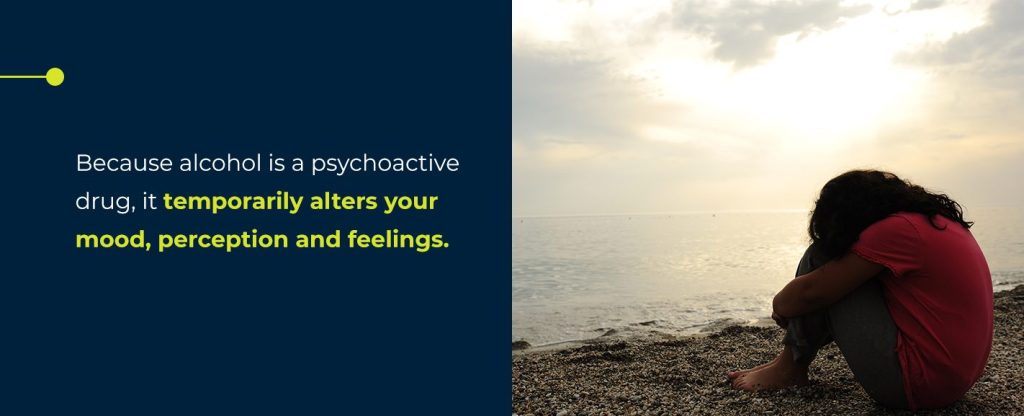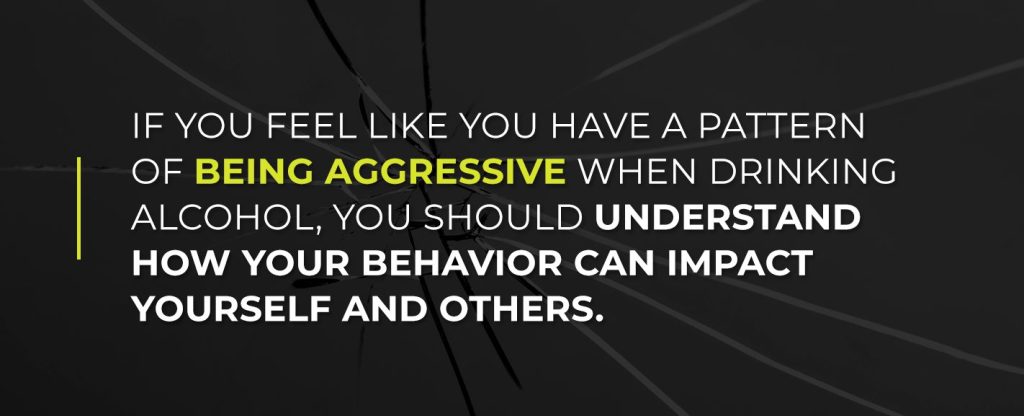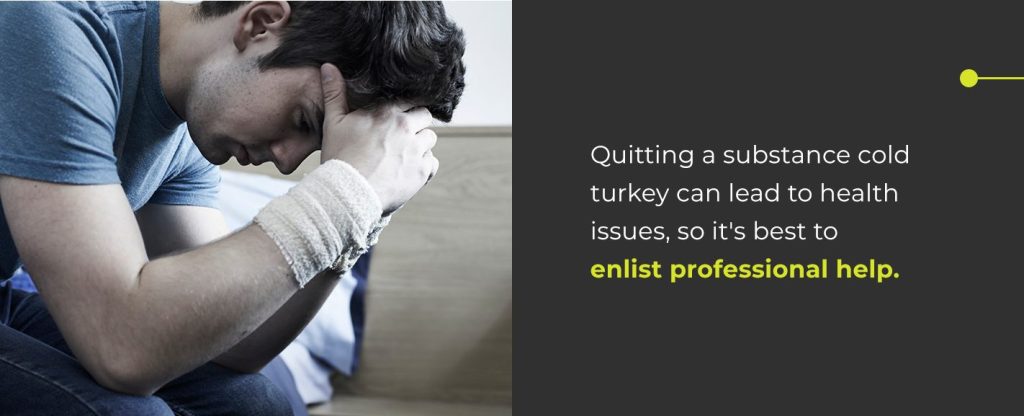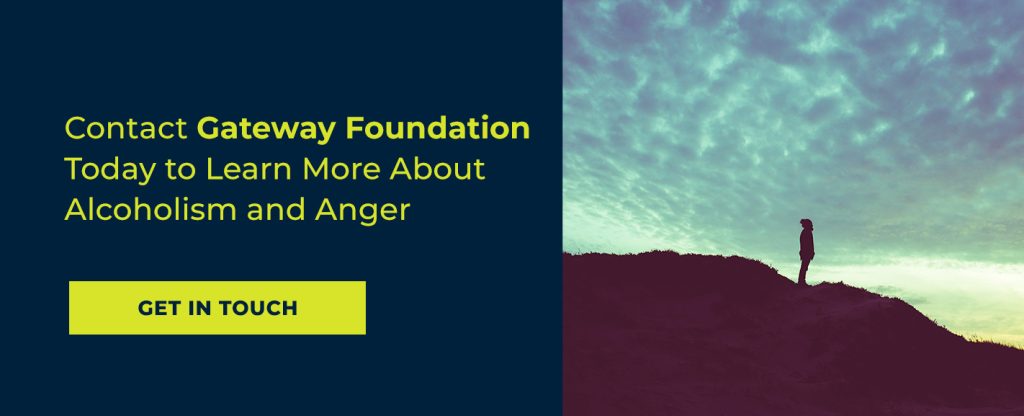- Feb 28
- AddictionMental Health Treatment
Have your friends ever referred to you as an “angry drunk”? Becoming angry or irritable when you drink is a relatively common experience — an often-cited body of research by the World Health Organization notes that aggression has a closer link to alcohol than any other kind of psychoactive drug. But why do some people get angry when drunk? There are several risk factors, all of which impact people differently.
Continue reading to learn more about the link between alcohol and anger, including which risk factors exist, how alcohol-related aggression can be dangerous and more. By understanding how alcohol abuse influences your mood, you can learn to make positive choices instead of ones you may regret.
The Relationship Between Anger and Aggression
Researchers have studied the connection between anger and aggression for years. There’s a reason the angry drunk is such a familiar stereotype. However, it’s about more than getting easily upset or having a short fuse when you drink alcohol. The outcomes of alcohol and anger can be hazardous, causing traumatizing situations for the inebriated person and the people around them.
The Difference Between Anger and Aggression
There’s a crucial distinction between anger and aggression. While anger is an emotion you experience when you feel threatened, aggression is a hostile behavior that results in physical or psychological harm to yourself or others. Some individuals exhibit “trait anger,” a personality trait that means they continually look for triggers that make them angry.
Typically, anger will lead to aggression unless something happens to resolve the situation. If an intoxicated person becomes upset because the bartender refuses to serve them, help from a friend might calm them down. If no one can defuse the tension, they may become an aggressor, escalating the situation to a violent one.
How Alcohol Works Affects Your Behavior

Because alcohol is a psychoactive drug, it temporarily alters your mood, perception and feelings. Intoxicated people may feel more outgoing, lonely, joyful — or angry. These emotions can become heightened in potentially extreme ways. For example, if you start drinking when you’re lonely and sad, you may find the alcohol makes you feel even more desolate and distressed than you did when you were sober.
It’s sometimes easier for angry people to become aggressive when they’re inebriated. While that’s not always the case, it’s more likely. A slight annoyance may turn into an infuriating problem, thanks to alcohol.
What Is Alcohol Myopia?
When it comes to anger specifically, people may experience a phenomenon called “alcohol myopia” in addition to their already heightened emotions. This scenario involves losing your sense of perception under the influence. As a result, you may be overly aggressive during a situation where you’d otherwise notice the cues that tell you to think more rationally. In some ways, alcohol makes us defy all logic.
Furthermore, alcohol can make you focus too much on specific words or behaviors from other people. If you see someone cut in front of you in line for the bathroom at a bar or concert, you may react aggressively when you otherwise wouldn’t mind. When drinking, it becomes increasingly challenging to interpret information logically. By not seeing situations clearly, you endanger yourself or others.
As a whole, alcohol use naturally heightens emotions, and for people who are predisposed to aggressive tendencies, it can quickly make bad scenarios worse.
Typical Risk Factors for Alcohol-Related Aggression
Many people may naturally become angry or upset when drinking, but it’s not necessarily their fault. Sometimes, people with alcohol use disorders have an unhealthy relationship with alcohol due to specific genetics. As a result, drinking is somewhat of a predisposed habit.
Unfortunately, feeling aggressive from alcohol can stem from more than one variable that’s beyond your control. Aside from existing anger issues, people can turn into aggressors when drinking for several reasons.
- Gender: Typically, people who have issues with alcohol and anger are men. One study shows that men who actively suppressed unwanted thoughts, specifically those that contradict the “tough” masculine norm, are more likely to exhibit aggressive behavior when consuming alcohol excessively. While women can be belligerent when drinking, men experience the effect more often.
- Drinking habits: Those who binge drink may show aggressive behaviors more often than people who drink less alcohol more slowly. Even one binge-drinking episode can result in violence. Therefore, it makes sense that individuals with alcohol addictions can exhibit anger issues when intoxicated.
- Social factors: Many of us are subject to peer pressure. If your group of friends consistently behaves aggressively when drinking, you’ll likely begin to feel the same emotions. Over time, exposure to the same negative behaviors makes it increasingly easier to embody them yourself.
- Mental health: A common contributor to alcohol overuse is mental illness. You may drink to excess to cope with symptoms of depression, anxiety or other mood disorders. For example, people living with post-traumatic stress disorder experience aggression because of it, turning to alcohol as an outlet in a way that becomes an unhealthy cycle of anger.
- Stress: While some amount of stress is inevitable and can even be healthy, some people use alcohol as a release valve for the tension they experience in life. This behavior can quickly become a pattern — someone begins drinking because they’re angry and anxious about something that happened, and they become aggressive in no time. As a similar variable, financial or relationship problems can also cause people to be more angry than necessary when inebriated.
- Personality: Everyone has slightly different personalities. These traits can play a role in whether you feel aggressive when drinking alcohol. Along with trait anger, people who naturally have thrill-seeking tendencies may seek violence when drinking. Since their inhibitions are lower when intoxicated, searching for that “high” can quickly become dangerous.
- Trauma: In some instances, trauma can be a vicious cycle — abuse victims may eventually start mimicking their abusers. If someone has experienced abuse or is currently experiencing abuse, they may manifest their trauma in the form of anger. This facet of your personality may only become noticeable when you’re drinking, making it challenging to recognize.
Overall, exhibiting one or a combination of the above factors can increase your chances of becoming angry when intoxicated.
The Effects of Alcohol-Related Aggression

If you feel like you have a pattern of being aggressive when drinking alcohol, you should understand how your behavior can impact yourself and others.
No matter the reasons behind feeling anger when drinking alcohol, such behavior can be harmful. By consistently becoming angry or belligerent when you drink, you put yourself and others at risk. Therefore, seeking a solution for alcohol-related aggression is essential for your future health and safety.
Here are a few effects of aggressive behavior related to drinking.
1. Poor Decision-Making
An aggressive drunk may make poor decisions that lead to worse scenarios. Since your judgment becomes clouded when you’re intoxicated, a simple misunderstanding can quickly turn into a bar fight. Furthermore, an angry drunk may not feel like consequences matter, making it seem like a good idea from their perspective to create or partake in a dangerous situation.
2. Assault
According to research compiled by the National Institute on Drug Abuse, alcohol use is a considerable contributing factor to sexual assault. Similarly, in nearly 40% of violent incidents, surveyed individuals from the United Kingdom said they believed their perpetrator was under the influence of alcohol. While drinking alcohol isn’t the sole reason for assault, it plays a substantial role in whether someone commits a violent crime.
3. Domestic Violence
Becoming angry when intoxicated can lead to domestic violence incidents. In a WHO assessment on domestic violence and alcohol, 55% of surveyed Americans stated they thought their partner was intoxicated during a physical assault. In most cases, women are at a higher risk of experiencing alcohol-related domestic violence from male partners.
4. Impulsivity
Those with alcohol dependence may be more impulsive over time. When you heavily consume alcohol, your prefrontal cortex becomes damaged, altering your decision-making capabilities. Therefore, people who rely on drinking as a coping mechanism can be more inclined to make rash choices, such as having unprotected sex or getting into a car with a stranger. This poor decision-making may lead to unsafe situations.
This aggressive behavior may result in other issues, such as verbal abuse. If drinking causes a blackout, you may not even remember being aggressive unless someone reminds you about it. By perpetuating such behavior, people can end up damaging meaningful relationships — yet another effect of alcohol-based aggression.
To combat aggressive behavior when drinking, individuals should consciously seek help.
How to Prevent and Treat Alcohol-Related Aggression
Fortunately, people who become irrationally mad when drunk can work to prevent and treat their behavior.
1. Partake in an Alcohol Misuse Treatment Program
The most self-evident way to stop being an angry drinker is to quit drinking altogether. By ending alcohol misuse, you can make positive decisions with a clear outlook. Those who are dependent on alcohol should participate in alcohol addiction treatment to break the cycle. Remember, quitting a substance cold turkey can lead to health issues, so it’s best to enlist professional help.

These days, people who misuse alcohol can enroll in various treatment programs, whether you choose the 12-step approach or decide to enter residential treatment. If you’re looking for help getting started, it’s wise to speak with your physician first. They can offer you support as you go over every available option. Together, you can choose the best course of treatment for your needs.
2. Seek Anger Management Support Groups
Of course, alcohol can heighten anger issues. If a health professional has diagnosed you with anger management problems, you may find these get worse when you drink. Alongside quitting alcohol, you could benefit from attending an anger management support group. Typically, support groups have professional leaders, like social workers or psychologists, so you can ensure you’re getting expert advice.
In addition to receiving guidance from experienced professionals, support groups are effective for building relationships. Recovering from an alcohol use disorder can be isolating, especially when you consider how widespread drinking culture is in the United States. In a support group, you can meet like-minded individuals who can help make recovery that much easier.
Does a support group seem like it might be out of your comfort zone? Attending one-on-one therapy with a licensed therapist can help you work through anger issues in a more private setting. Scheduling an appointment with a professional who specializes in anger management may be more beneficial than participating in group therapy if you have social anxiety.
3. Learn to Be Self-Aware
This point is easier said than done, but you can achieve it with help from a treatment program. If you think about it, a crucial part of being aggressive when intoxicated is lacking self-awareness. Those who don’t think about the consequences of their actions are more likely to adversely affect themselves and others. Additionally, when you don’t reflect on mistakes you’ve made, you’ll probably repeat them.
Start by thinking about your feelings regarding alcohol and anger. Have family members or others mentioned concerns about your alcohol consumption? Did you recently experience an incident that stemmed from your alcohol-related aggression? These situations likely spark emotions when you think about them — perhaps you feel embarrassed or ashamed.
Learning to be more responsible for your actions takes time, but it’s a necessary step for individuals who have alcohol and anger management problems. As you become more self-aware, you’ll make better choices about alcohol consumption. A support group or therapist can be a powerful asset here.
Contact Gateway Foundation Today to Learn More About Alcoholism and Anger
There’s no better way to put it — properly addressing alcohol-fueled aggression is crucial for your well-being and relationships. This unhealthy behavior can have numerous ramifications. Fortunately, getting help is straightforward. By seeking recovery for problems with alcohol and anger, you can work toward a more positive life. Gateway Foundation is here to help.
For years, our team at Gateway Foundation has provided comprehensive recovery programs for people going through alcohol misuse. Through various treatment options, we can help you get back to a life of normalcy. For more information about how we can assist you in your recovery journey, read about our alcohol addiction treatment options.
If you or a loved one is ready to overcome alcohol abuse, please contact us online or call 877-505-4673 — we look forward to hearing from you.



